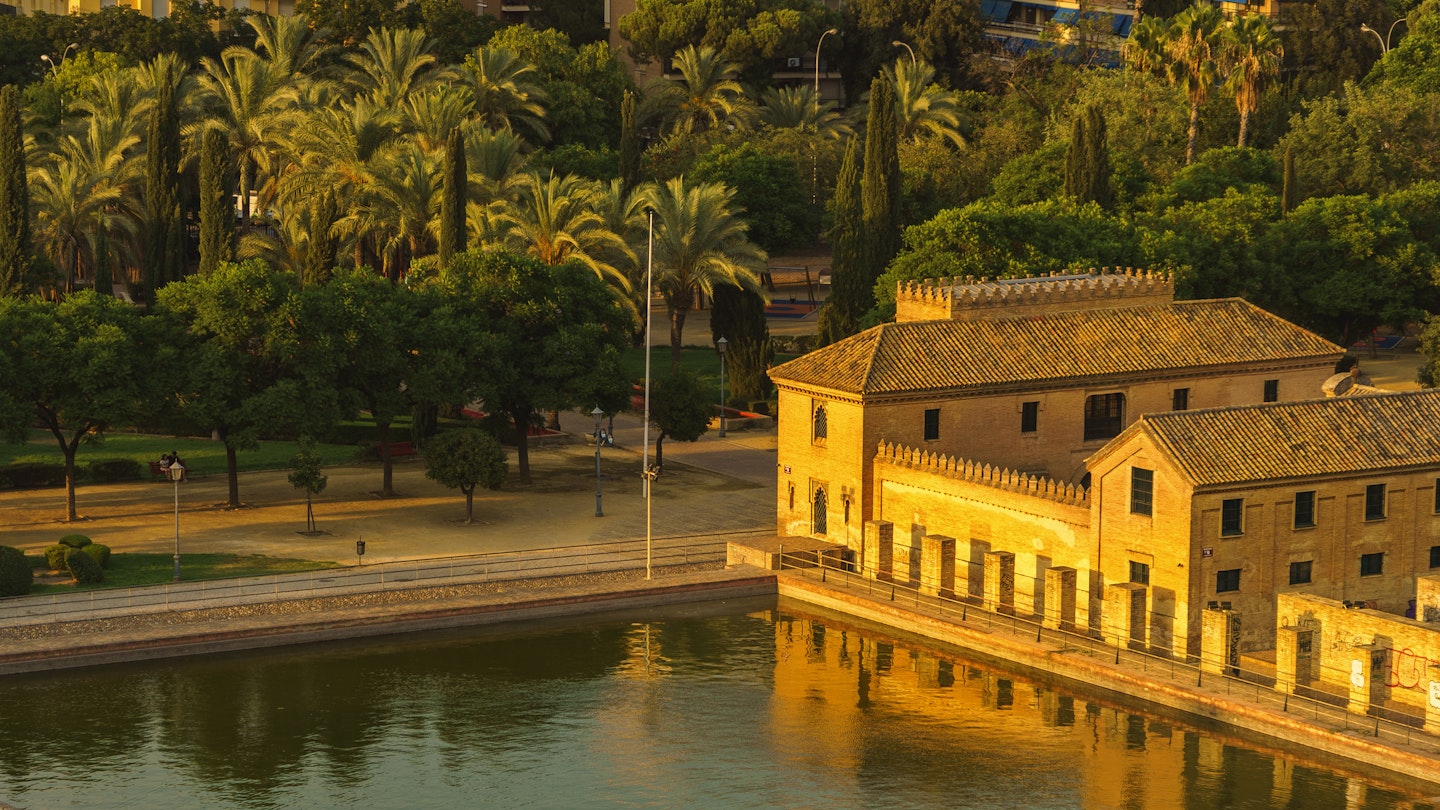Seville is always a delight – yet in the blistering summer heat, it’s essential to find shaded sanctuaries where you can cool down. Thankfully, the city has a plethora of appealing parks and gardens. In these green spaces, you can find respite from the sun under leafy canopies next to refreshing ponds and trickling fountains – especially important given temperatures can push 90°F (32°C). Here are some of the best parks in Seville.
Start at Seville’s Best-Known Green Space, Parque de María Luisa

The most famous park in the city is Parque Maria Luisa, which encompasses the famed Plaza de España, the monumental square built for the 1929 Ibero-American Exposition. Its Neo-Moorish tile-studded buildings wrap around a long boating canal and an impressive central fountain, while horses pull romantic carriages down shaded pathways.
Under elegant palms and fragrant orange trees, you’ll find perfectly manicured flower gardens, tranquil ponds, Moorish-tiled ceramic benches, and star-shaped fountains. The park is also home to the fascinating Museo de Artes y Costumbres Populares de Sevilla, the Museo Histórico Militar de Sevilla (Seville’s Military Museum), and the Casa de la Ciencia (Science Museum). It’s not hard to see why this is one of the most popular parks in Seville.
Pack a Picnic to Enjoy at Parque de los Príncipes
The Parque de los Príncipes (Park of the Princes) is located in the neighborhood of Los Remedios, across the Guadalquivir River from the center of Seville. Named after former Spanish monarchs King Juan Carlos and Queen Sofia, this is a tranquil park with lots of green grassy areas and shady trees, making it one of the best picnic parks in the city. Additionally, it’s filled with a vibrant array of trees including delicate Japanese plums, bright purple jacarandas, and many varieties of orange and lemon trees. At one end is a large pond with a central island and numerous ducks, while a sports field and basketball court at the other end offer active recreation.
Smell Fragrant Orange Blossoms and Jasmine at Jardines Catalina Ribera and Jardines de Murillo
Two of the prettiest parks in Seville, the Gardens of Catalina Ribera and Murillo, lie side by side and run along the old walls of the Moorish palace. Listed as part of the Andalusian Historical Heritage, the Jardines of Catalina Ribera were built between 1898 and 1921 and are dedicated to Catalina, a Sevillian noblewoman who founded the Hospital de los Cinco Llagues. In the gardens, you’ll find a large fountain adorned with an image of her created from the city’s iconic colorful tiles, and a monument to Christopher Columbus situated in the center.
Next to this lie the Gardens of Murillo, named after the famous 17th-century Sevillian painter. Both gardens consist of a series of pathways and tiled benches, interspersed with fragrant plants ranging from orange trees to jasmine bushes, pink oleanders, and numerous tropical palms. Keep an eye out for the gigantic ficus tree here, which is over 100 years old.

Enjoy the Shade at Jardines de las Delicias
The Jardines de las Delicias (Garden of Earthly Delights) lie across the road from Parque Maria Luisa and run alongside the Guadalquivir River. Created between 1826 and 1829, this leafy park is adorned with numerous elegant marble statues and landscaped flower gardens. It boasts both large pathways and secluded areas with benches, making it ideal for leisurely strolls or simply relaxing in the shade. The park is home to over 100 different species of plants, including acacia trees, blue jasmine, bougainvillea, and bitter orange.
Follow the Riverfront to Jardines de Guadalquivir and Jardín Americano
The gardens of the Guadalquivir River lie on the Isla de Cartuja, following the water from the Puente de la Barqueta to the Pasarela de la Cartuja bridge. Both spaces were created for the Americas Expo of 1929 and feature picturesque riverside walkways along with a diverse array of plants. The Jardines de Guadalquivir are filled with eclectic sculptures, lily ponds, and a small hedge maze, while the Jardín Americano serves as a botanical garden featuring plants brought over from the Americas, including cacti, large spiky agave, prickly pears, tobacco plants, yuccas, and ferns.
Continuing further south along the river, you’ll find the Parque Fernando Magallanes, a small riverside park with ample grass, open spaces, and exotic palm trees. Next to this is the city’s excellent contemporary arts center, which is housed in an old monastery.
Seek Out Sports and Nature at Parque del Alamillo
Created for the Expo of 1992, the sprawling Alamillo Park lies on the northern edge of the city at Isla Cartuja. With many wide-open spaces, it’s perfect for playing sports and taking leisurely riverside strolls. At one end, urban farmers tend vegetable beds and fruit orchards, while golfers enjoy a nine-hole course. There are also two large lakes, one dedicated to wakeboarding and the other featuring a bird-watching observation deck (making it one of the best parks for nature enthusiasts in Seville). Additionally, there’s a bar for refreshments, and a miniature train ride for children. Keep an eye out for the fascinating sculptures in the park, including one depicting Don Quixote.

Channel Seville’s Moorish Past at Jardines de la Buhaira
These Arab-inspired gardens are set around a stunning Moorish-style palace and date back to the reign of Al-Mutamid in the 11th century. Filled with Islamic water features and fountains, the park is even home to a restored ancient swimming pool (unfortunately not open to swimmers today). Date palms and tall cypress trees line the pathways; kids can amuse themselves at a small playground.




